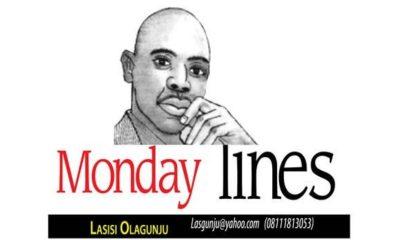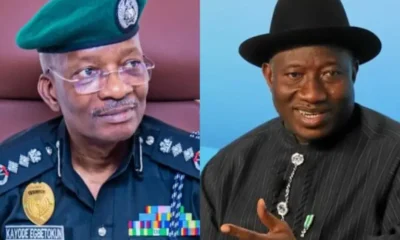News
OPINION: Nigeria: A History Of Scandals
Published
1 month agoon
By
Editor
By Lasisi Olagunju
On October 29, 1974, the Nigerian Ministry of Defence, through the Ministry of External Affairs, wrote to Nigerian missions and embassies abroad that it wanted to buy tonnes of cement to build barracks for its post-civil war armed forces of 200,000 officers and men. The Nigerian Army had just about 8,000 personnel before the war. The ministry not only made that open call for supply of cement, it avoided competitive bidding; it fixed the price at $60/per ton. Analysts noted that that offer price was five dollars more than the prevailing world market price. But, no wahala. Price and pricing have never been a problem for Nigeria. In fact, at that point in our growth (or decadence), the problem we had wasn’t money, it was what to spend it on.
So, between December 1974 and June 1975, our Ministry of Defence, which needed just 6 (six) million metric tonnes of cement, awarded 69 contracts for 16.23 million metric tonnes valued at almost $1billion. Other agencies and departments of government soon got on board the cement armada. History says half of the world’s cement was diverted to Nigeria. One researcher (Fabian Ihekweme, 2000) found that “approximately half the merchant ships in the world which were suitable for carrying cement became involved in supplying Nigeria.” An American newspaper reported that “the massive orders led to an armada of ships anchored off the Lagos coastline…stretching as far as the eye could see. Many were decrepit hulks manned by skeleton crews dispatched by ship owners to collect demurrage costs…”
The end was the famous cement scandal of 1974/75 which The New York Times of June 28, 1976 described as “a web of kickbacks and bribes involving government officials, foreign ship owners, corrupt purchasing agents, unscrupulous middlemen, phony corporations, dubious letters of credit and Swiss bank accounts.”
The scandal was not just about us biting more than our mouths could contain. We not only allowed and accepted substandard cement from suppliers, concessions were granted by Nigeria approving extension of expiry dates for expired products. Hanaan Marwah, an African infrastructure historian formerly with the London School of Economics, did a major work on this in 2020 for Business History. She places the scandal “in the context of debates about corruption, organizational failure and a ‘resource curse’ in Nigeria.” We had a ports congestion of over 400 ships queuing to offload cement. To compensate for the delay at the ports, we offered generous demurrage. We increased payable demurrage from the standard $3,500 per day to $4,100/ per ship per day. Some ships came carrying nothing; some did not come near our ports at all; some never existed. Yet they all claimed demurrage. And we paid. An account says Nigeria ultimately paid an estimated $240 million in real and phony demurrage costs.
FROM THE AUTHOR: OPINION: Kumuyi, Tortoise And Looters Of Noodles
In instances when deals were too criminally stark to click, Nigeria demurred in payment of costs for delays. And some audacious fake suppliers went to court to demand payment for their ashy goods. For this, Nigeria had a harvest of court cases, home and abroad. The very interesting UK Supreme Court appeal case number (1978) EWCA Civ J1219-3 appeals to me here. That case was between a company, Etablissement Esefka International Anstalt (Plaintiffs/Respondents) and the Central Bank of Nigeria (Defendants/Appellants).
Lord Denning, Master of the Rolls, who presided over the appeal, tells the story of the case better in elegance of language and in ghastly details – and copiously I am quoting him:
“This is another case involving what has been called in the papers ‘the cement scandal’ in regard to Nigeria. It so happened a few years ago that the Ministry of Defence in Nigeria ordered vast quantities of cement from all over the world. The Central Bank of Nigeria issued letters of credit to pay for all the cement which was coming in, and a good deal of it was payable through London banks.
“Great quantities of cement were shipped to Lagos: and at one time there were 300 or 400 ships waiting outside the port of Lagos to discharge the cement. There were not enough wharves or quays to take it there, let alone all the other goods coming into Nigeria. So immense demurrage was built up on the ships which were lying outside the port of Lagos for months and months. The story of what happened will be found in the case of Trendtrex v. The Central Bank of Nigeria, in which that bank claimed sovereign immunity and said they could not be sued. It was held in this court that they could be sued in the ordinary courts. That was the position in law. This is a further aspect of that “cement scandal”.
READ ALSO: OPINION: Tinubu, Matter Don Pass Be Careful
“In this case the Ministry of Defence ordered 240,000 metric tons of cement in December 1974 at a price of U.S.$59.90 per metric ton c.i.f. Lagos. The total purchase price was U.S.$14,376,000. That was ordered and agreed to be paid for by the Ministry of Defence in Lagos from a company (I will call it such) called Etablissement Esefka International Anstalt of Liechtenstein, but operating apparently from an address in the Strand, London. The Nigerian Ministry of Defence said that letters of credit would be opened accordingly – transferable, divisible letters of credit. The letters of credit were issued on the 18th March, 1975. The advice was given by the Midland Bank here on the account of the Central Bank of Nigeria for these monies to be paid for the goods against documents. The documents included commercial invoices (four copies), a full set of four bills of lading, an insurance policy and the like. The ordinary set of shipping documents was to come forward. The credit was irrevocable, transferable and divisible: and, furthermore, there was a special provision by annexure for demurrage to be payable in the total sum of U.S.$4,100 a day. That demurrage also came under the letters of credit which were issued by the Central Bank of Nigeria through the London correspondents the Midland Bank in favour of the Liechtenstein company Esefka International.
“I do not suppose that Esefka International had any cement at all themselves. They had to buy it; and apparently successfully in several cases. A good deal of the cement was shipped, a good many of the ships were held up, and a good deal of demurrage was payable. As to a great number of them, no question arises. But a question does arise in regard to eight vessels which were supposed to have shipped about 94,000 tons of this cement. With regard to those eight vessels, the shipping documents, the bills of lading, certificates and the like were presented to the Midland Bank as though everything was in good order. On being presented with those documents, the Midland Bank in London paid out huge sums in respect of these goods. Nearly $6,000,000 were paid out in respect of these ships.
“Lo and behold. I will come almost to the end of the story in a moment. Solicitors from London have been out to Lagos on behalf of the Central Bank of Nigeria. They have been to Greece, and they have obtained very strong evidence that there were no genuine documents at all – that these bills of lading were not genuine, but were forged. There is great doubt whether these eight vessels ever existed at all. What happened was that bills of lading were presented on behalf of three of these vessels by Esefka in Liechtenstein, and five others by a gentleman called Klemo. This is the way they got the money. Mr. Klemo, for example, on the 21st June, 1975 presented to the bank in London four commercial invoices apparently in order, full sets of 4/4 shipped bills of lading apparently in order, giving the name of the ship ex so and so. For instance, I have one before me for the m.t. Lion ex Avgi.In practically every one of these eight ships the bills of lading appeared as if there had been a ship which had changed its name. Nearly all the bills of lading were made out on that basis, and signed by the master, that they were shipped at a port in Greece called Volos.
READ ALSO: OPINION: Ibadan Blast, Makinde And Federalism
“When the solicitor from London went out to Greece he found that it was all “moonshine” in effect.They had never had any of these ships in Volos at all. And Volos had not got the quantity of cement or anything like it to fulfil these supposed bills of lading. What is more, the harbourmaster did not know of any being put on board or sent forward, and so forth. So a very strong case was made out that these bills of lading were not genuine at all. They were forged in respect of goods which had never existed.
“In addition, added to these documents, there was a certificate of value given by Mr. Paul Harris, who seems to be a leading member of this Liechtenstein company Esefka International. He apparently lives in Zurich now. He gave certificates of value and certificates of origin of these goods, certifying himself that the invoices were all correct and the goods were produced in Greece and so on. When he was asked for an explanation of it, he said that he signed it in blank thinking that it would be all right in the ordinary way. That sounds a little suspicious to me: people ought not to sign certificates of this kind in blank and leave them for other people to fill in. At all events, there it was.
“Esefka, the Liechtenstein company, got money on three vessels. There is a question of whether those vessels ever existed. Klemo got money on five other vessels, and the same question mark arises about those. And the long and the short of it is that on these supposedly genuine documents Mr. Klemo and the other people got U.S.$6,000,000.
“When the solicitor from London found this out, he advised the Central Bank of Nigeria and the Midland Bank in London that they were not to pay any more money. They were certainly not to pay any demurrage with regard to this claim under these letters of credit when this kind of fraud, as he said it was, had been perpetrated.
“Was there such a fraud or not? Of course it is a debatable question. We have not got anywhere near the trial itself. But for myself, in view of the strength of the evidence which has been collected by the London solicitor in Lagos and in Greece, it seems to be elementary that, if it was a genuine transaction, Mr. Paul Harris (who was obviously the genius behind it) and Mr. Klemo (who was the person who was supposed to have supplied the goods) would have made affidavits or come forward to show that these were genuine goods and these were genuine shipments.
FROM THE AUTHOR: German Airports Strikes Worsen, Passengers Face Flight Disruptions
“But there are no such affidavits. All we know about Mr. Klemo is that he supposedly in May 1975 took up a divisible part of 60,000 tons of this supply and took up the transfer of the corresponding letters of credit. There it is…”
That was about us from the legendary Lord Denning.
The Shagari regime of 1979 to 1983 had its “Rice Armada” scandal into which Nigeria reportedly sank over N4 billion. A dollar exchanged for 55 kobo in 1980 when we minted that scandal. The scandal is foregrounded by a story of food crisis in Nigeria. The price of rice tripled with consequent political and social implications. President Shehu Shagari responded with mass issuance of import licences for 200,000 metric tonnes of rice in January 1980. A big scandal soon afflicted the policy. Stories of how sweet sleaze was being extracted from people’s hunger painted the street red. As more and more rice reportedly came in, the price of the commodity was going up, aiming at the roof. Who and who got the licences? Jon Kraus answers that question in his ‘Nigeria under Shagari’ (1982) published in Current History, Volume 81. Kraus writes that when the scandal broke, and the National Assembly demanded a list of the licencees, what it found on the list of rice importers were “records and electronics companies.”
Further to the lawmakers’ horror, on the list were names of their leaders in the Senate and in the House of Representatives. The Washington Post of 26 December, 1980 reported that one of the rice merchants, the deputy leader of the House of Representatives, was very “unapologetic about his floor-tile company receiving one of the highly sought after licenses.” To reporters who questioned him, The Washington Post said the House leader posed a counter question: “Do you think because I am in the House of Representatives I should stop doing business? I have been in business a long time.”
The arrogance in the above statement shocked Nigeria of 1980. If you followed proceedings in our senate in the last seven days, you would know that such audacity of privilege won’t shock anyone in Nigeria of today. Bola Tinubu’s presidency calmly admitted last week that he presented a budget of N27.5 trillion to the National Assembly but the “National Assembly, in its wisdom, increased the amount proposed by the executive by N1.2 trillion.” The lawmakers returned to Tinubu a pregnant budget of N28.7 trillion, largely of borrowed money, for him to sign. And he signed it; no query raised or question asked; no explanation or answer given. Part of that infusion is the provision of scandals that will sink one borehole for N193 million.
All around us here we see what the French call déjà vu – the feeling that you’ve experienced something before. Unlike the French who thought it a mere feeling, here, the experience is real. President Shehu Shagari, in his autobiography ‘Beckoned to Serve’ wrote on what he called “the greed culture” which dominated the legislative life of his regime. He reminisced that “in the 1981 financial year alone, the three million naira that I proposed for improvements to legislators’ quarters was hiked to twenty million naira by the joint committee on finance and appropriation” (see page 269-270). Now, do the calculation. How much would that criminal hike in cost be today? A dollar exchanged for 60 kobo in 1981.
“Nigeria, long known for its flamboyant corruption”, was how the journal, ‘The Historian’, synopsized an article on Nigeria by Steven Pierce five years ago. Because character is smoke, scandals of same hues and similar odour have continued to climb the ladder of time with us. Indeed, the narratives in the cement scandal of fifty years ago would sound so familiar to Nigerians of this day. You remember the oil subsidy scandal and its sad, lurid details. Under the military in 1974/1975, people demanded and got paid demurrage for goods that never existed. In this democracy, people have collected (and may still be collecting) subsidy payments for vessels of petrol that never came here or that never existed.
Our elders say the fear of death does not prevent soldiers from going to war. Tinubu’s friends should tell him to learn to say no to his National Assembly. His success is in saying not yes to whatever is wrong. Great leaders step on toes. I read an article in the Financial Times last year on why saying no may be a virtue. On the very top of that article the author planted a quote: “You can only achieve great things if you know how to say no.” The president presumably saw everything in that budget of transparent sleaze and scandal yet he did not withhold his assent. Tinubu’s office said the big boss closed his eyes to whatever was added to what he presented “in the spirit of democracy which allows give and take.” Yet, last Friday, the president waxed patriotic. He told his visiting party patricians: “As we are fighting corruption, smugglers and old subsidy beneficiaries, they most certainly will fight back. All those who falsified records and became losers with the subsidy removal, they will fight back. But we will defend our people. The treasury belongs to the people, and that sacred trust must not be abused.”
It was so nice hearing the president pronounce “the treasury belongs to the people.” But some carnivores plan to sink 427 boreholes with N82.5 billion public funds and the president endorsed it with his signature. What else is the meaning of complicity?
You may like


Bello And Enenche: A Tale Of Two Lions [OPINION]


OPINION: Why Were Miyetti Allah And Tinubu’s Iyaloja In Ibadan?


OPINION: Bobrisky’s Masque, Yahaya Bello’s Boa


OPINION: Onitiri-Abiola And The Madness In Ibadan


OPINION: For Yoruba Muslims And Pentecostals


OPINION: Bobrisky And Our Other S/He Offsprings
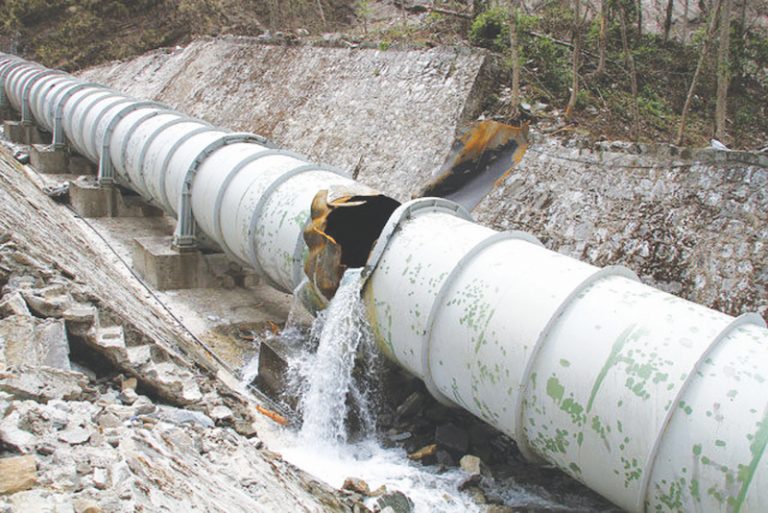
The Edo State Police Command has arrested three pipeline vandals in the Obazagbon community of the Orhiomwon Local Government Area.
The suspects include Jackson Aluche, aged 45; Oke Okoro, aged 30; and Oluchukwu Chukwuma, aged 18.
It was gathered that the incident occurred on April 14 at about 10:30 a.m.
READ ALSO: Kanye West To Launch Yeezy P0rn Studio With Stormy Daniels
When contacted by our correspondent, the state Police Public Relations Officer, Chidi Nwabuzor, confirmed the incident.
He added that the suspects were caught siphoning crude oil and smashing a PAN Ocean Oil Corporation pipeline.
Nwabuzor noted that the suspects admitted to the crime, claiming that one AKA Doctor had hired them to carry out the deed and that they would be charged with court charges.
READ ALSO: Two Fake Police Inspectors Arrested In Edo
He said, “On April 14, 2024, at about 1030 a.m., the operatives of the State Criminal Investigation Department, while acting on credible intelligence, arrested three suspects, namely, Jackson Aluche, 45 years old; Oke Okoro, 30 years old; and Oluchukwu Chukwuma, 18 years old, at Obazagbon community in Orhiomwon Local Government Area of Edo State.
“They were caught breaking a crude oil pipeline for Pan Ocean Oil Corporation and siphoning crude oil. The suspects made statements and confessed to the crime, saying that they were employed by AKA Doctor to carry out the act. Suspects will soon be charged in court.”
News
Cultists Arrested For Invading Anambra Hotel With Charms
Published
10 hours agoon
April 26, 2024By
Editor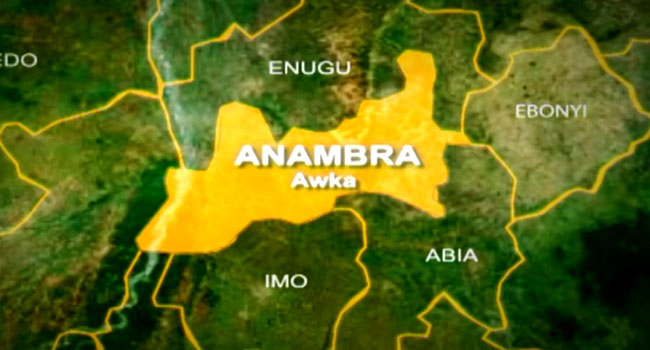
No fewer than 11 members of a suspected cult group allegedly terrorising the people of Ihembosi community in Ekwusigo Local Government Area of Anambra State have been arrested by operatives of the Zone 13 Police Headquarters, Ukpo, Anambra State.
The suspects were arrested for allegedly invading the premises of Las Vegas Hotels Limited at Ubahu village in the area.
About 12 other members of the group are said to be currently on the run as the police operatives are still trailing them.
According to a police source, who refused to be mentioned because he was not authorised to speak for the agency, the arrest of the suspects was carried out on Monday, following a strongly worded petition to the Assistant Inspector-General of Police in-charge of Zone 13 Police Command, Godwin Aghaulor. The Zone 13 Police Command controls police formations in Anambra, Enugu and some parts of Ebonyi states.
Aghaulor, who confirmed the arrests of the suspects in his office, on Thursday, said the police would carry out discreet investigations into the matter to ascertain the motives behind the action, while a manhunt had been launched to apprehend the fleeing gangsters.
READ ALSO: Tinubu Appoints Jim Ovia As Student Loan Fund Chairman
The Proprietor of Las Vegas Hotels Limited, Chief Omenife Onwuatu, had through his legal counsel, PJN Azubuike, petitioned the AIG seeking his intervention to curb the menace of the cultist group who he said went to the extreme of invading his hotel on March 10, 2024 with about 12 motorcycles, charms, cudgels, cutlasses, axes and other dangerous weapons and terrorised the owners, management and staff of the hotel, threatening to kill anyone at sight.
Onwuatu, who is also the Chairman of Ubahu village, had earlier warned the group to stop performing rituals in front of the stream in the area and to relocate their shrine to its base but his warning did not go down well with the suspects whom he simply identified as “idol worshippers, who earn their living through rituals.”
In the petition dated April 16, 2024, entitled, “Threat to life, cultism, terrorism, ritualism, threat of arson, conspiracy, forcible entry, trial by ordeal, assault, malicious damage and conduct likely to cause breach of peace,” the hotel proprietor lamented that during the invasion, the suspects forced open his hotel gate and deposited the charms at the entrance and premises of the hotel.
The petition read in part, “They chanted war songs, threatened to burn down the hotel and its premises, performed so many incantations and rituals in front of the hotel and its premises and passed death sentences on the owners and occupants of our client and thereafter escaped.”
READ ALSO: Two Fake Police Inspectors Arrested In Edo
“Before the invasion, the suspects had earlier in the day unlawfully assembled themselves in various locations in the town where they organised and planned the invasion, assembled their weapons, demonstrated their charms, chanted war songs and passed death sentences on the leadership of the community before setting out to invade the hotel premises which they variously threatened to burn down.”
The petition noted that to make matters worse, the suspects captured their atrocities in a video and sent in to the internet in order to display their impunity, intimidate the operators and customers of the hotel and put extreme fear in them to force them to abandon the premises or come and negotiate with them.
“The negative effect of this is that the Managing Director of the hotel, other directors, managers and staff, as well as the customers, were thrown into extreme fear for their dear lives. While the customers of the hotel at the time of the incident hurriedly checked out, others who heard or saw the incident completely avoided the hotel and cancelled their bookings and the Goodwill of the hotel proprietor and her fortune were maliciously destroyed and damaged,” it stated.
READ ALSO: Outrage As Kingsmen Flogged Anambra Man To Death [VIDEO]
The petitioner therefore requested the AIG to use his good offices to apprehend all the members of the gang and recover their tools and implements to bring them to book and nip in the bud their plans to kill the hotel operators and leaders of the community and burn down the premises of Las Vegas Hotels Limited.
As of Monday, the day the suspects were arrested, pleas by counsel for the suspects, Ibuchi Ewuzue for the police to release the suspects on bail were turned down as the Deputy Commissioner of Police in charge of the Zonal Criminal Investigations Department, was said to have ordered that the suspects should remain in detention until after investigations.
PUNCH
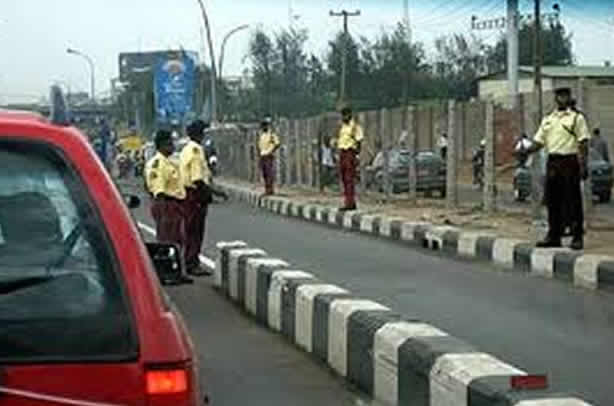
There was pandemonium, on Tuesday, after a fight broke out among some officials of the Lagos State Traffic Management Authority and those of Viju Company at the Oba Akran Avenue area of Ikeja, the state capital.
It was gathered that the incident occurred at midnight, resulting in multiple injuries to victims.
It was also learnt that one of the Viju Company’s motorboys had been shot, while others sustained hand stab wounds.
A video sent to our correspondent showed injured victims with blood on the hands, faces, and clothing of the LASTMA officials and Viju workers.
Speaking with The PUNCH, a driver at Viju, simply identified as Seyi, stated that soldiers, LASTMA officials, and touts came to impound their trucks at midnight and, in the process, stabbed his hand when he decided to fight back.
READ ALSO: Sad Story: Nigerian Who Relocated To UK In 2022 Beat Wife To Death With Skateboard
“We were sleeping on top of the truck, and we were not aware of anything. Some boys were just shouting that they were already parking the vehicles. We approached them and asked why they would be impounding vehicles at odd hours. LASTMA officials, soldiers, and touts who came were up to 100. When I decided to fight back, they used an axe to stab my back. I was surprised that soldiers came for such an operation.”
Another Viju official, Issa Tijani, said they had threatened to send the arrested individuals to Kirikiri Prison, adding that they must pay N700,000 to free their vehicles.
He said, “They did not just raid Viju Company but also the whole neighbourhood. I wonder how they were sure that the people who were involved were the staff members of Viju. The issue on the ground currently is that they told them that they would carry all those guys to Kirikiri Prison for no reason because, firstly, they are not sure if they are the ones. Also, they told them to come and bail their vehicles for N700,000, which I think is not fair, and it is suspicious that they came at midnight. They also broke a bottle on my head
A driver at Viju Company, Ismalia Asuma said, “I did not do anything for the LASTMA officials. We were sleeping on top of trucks when they came to raid. They came with soldiers, the task force, and ‘agberos’ (touts) to attack them. They even shot me in the back because I did not do anything.”
READ ALSO: LIST: 25 Countries Where TikTok Is Banned
When contacted, the Public Relations Officer, LASTMA, Adebayo Taofeeq, said the residents filed a petition complaining about Viju trucks impeding the road, adding that 54 vehicles were impounded in the area around 12 a.m.
“We received a petition from the residents about the Viju milk truck drivers blocking the road left and right and turning the dual lane into one lane. We even wrote a petition to the Lagos State Parking Authority. We acted on the direction of the Honourable Special Adviser on Transportation, Sola Giwa. By getting there on April 23 by midnight, we were able to remove 54 trucks.”
He added that some miscreants attacked the agency officials and that five individuals were arrested.
“After we completed that assignment, they went ahead to mobilise miscreants from the Agege area, and as a result of that, they injured seven of our officials. Our men did not use guns at all; the only thing we used was teargas, and we do not know if the task force people were present there.
READ ALSO: Don Advocates Drug Test For Lecturers
“While LASTMA operational vehicles were vandalised, 54 Viju milk trucks were evacuated during the enforcement operations. The police, working alongside LASTMA, arrested five of these individuals (Falomo Oluwafemi, Afeniyi Stephen, Olamide Adekunle, Chukwu Guaja Eze, and Adeshina Sulaimon) and seized various weapons, including broken bottles, iron rods, charms, knives, and cutlasses.
“The injured LASTMA officers were promptly taken to the hospital for medical attention. Hon. Sola Giwa, the Special Adviser to the Governor on Transportation, stated that the arrested individuals would be prosecuted by the government as a deterrent to others.”
All efforts to get the reaction of the Director, Press and Public Affairs, Lagos State Taskforce, Gbadeyan Abdulraheem, proved abortive, as he did not respond to calls and messages sent to his phone as of the time of filing this.

Three Suspected Pipeline Vandals Caught In Edo
Cultists Arrested For Invading Anambra Hotel With Charms

LASTMA, Viju Officials Clash Leaves 10 Injured
Trending

 Entertainment5 days ago
Entertainment5 days agoBridesmaids’ Dance At Wedding Causes Stir On Social Media [VIDEO/PHOTOS]

 Metro5 days ago
Metro5 days agoVIDEO: ‘UNN Lecturer’ Caught Pants Down With Married Student

 News3 days ago
News3 days agoDrama! Supporters Of Yahaya Bello Perform Rituals to Prevent His Arrest By EFCC [Video]

 Headline3 days ago
Headline3 days agoDrama As Women Fight Dirty, Breasts Fall Out During Spring Break Outing In US [PHOTOS/VIDEO]

 News3 days ago
News3 days agoVIDEO: Force PRO Orders Arrest Officers Caught On Video Bashing Driver’s Car

 Entertainment3 days ago
Entertainment3 days agoNollywood Actor, Zulu Adigwe Is Dead

 Headline3 days ago
Headline3 days agoMeet 17-year-old Nigerian Who Won $3.5m Worth Of Scholarships From Harvard, 13 Other Foreign Universities

 Metro3 days ago
Metro3 days agoEdo Cultists Kill Rival In Daughter’s Presence, Abandon Getaway Car

 News5 days ago
News5 days agoIGP, Jonathan Disagree Over State Police

 Headline3 days ago
Headline3 days agoVideo Of Girl Being Bullied, Slapped At Lead British School Sparks Outrage Online [PHOTOS/VIDEO]




